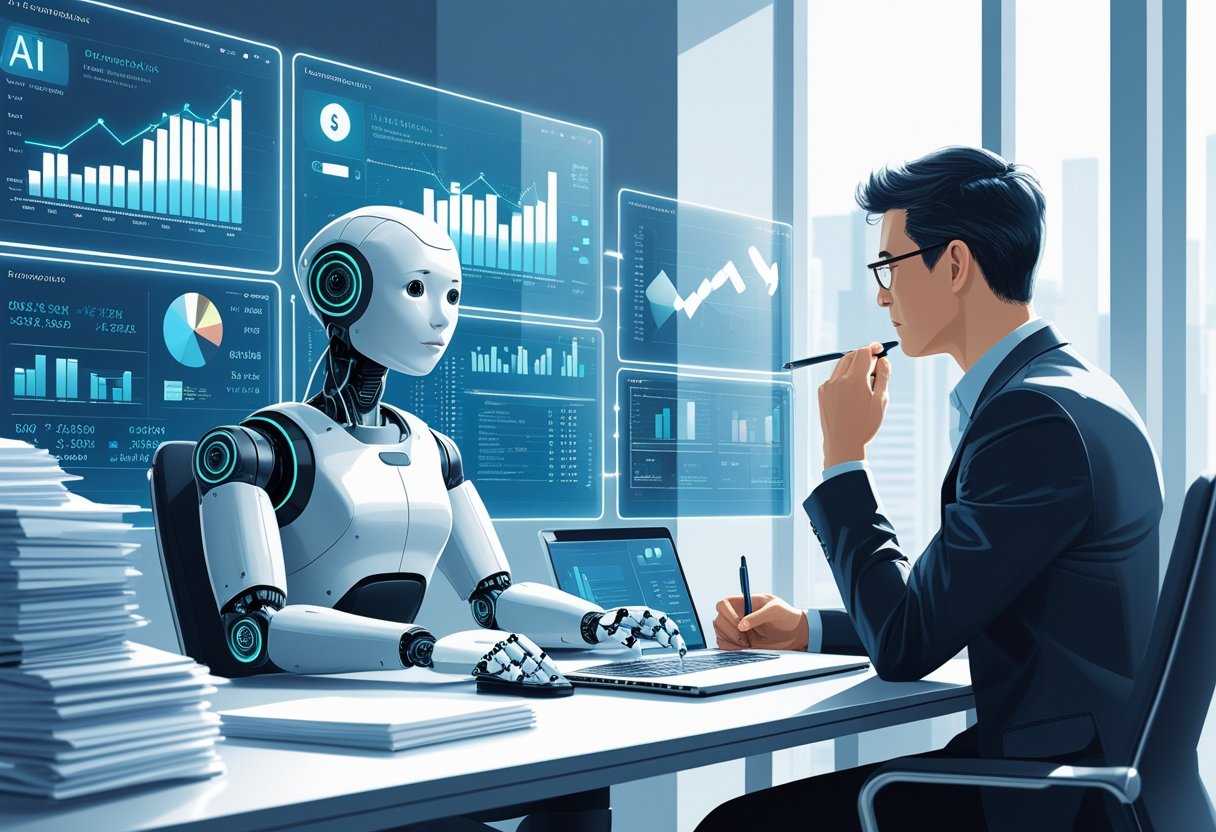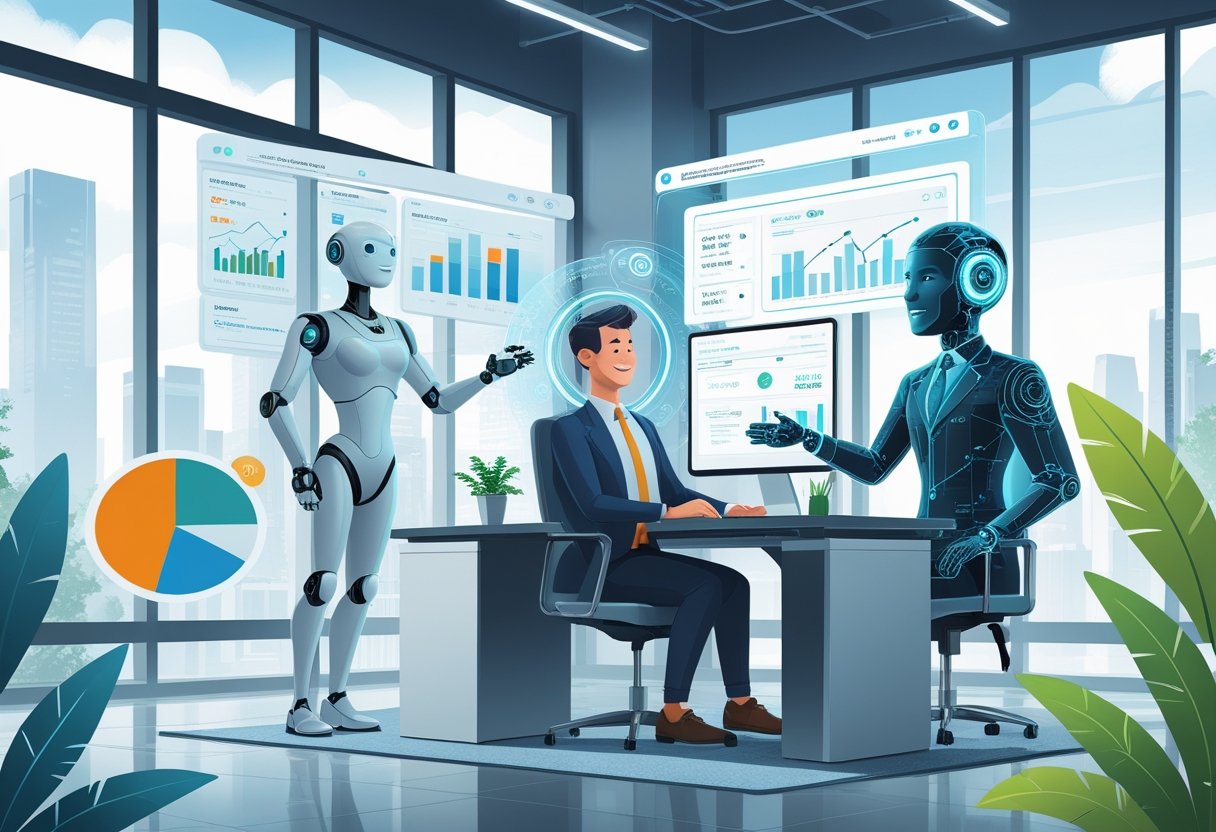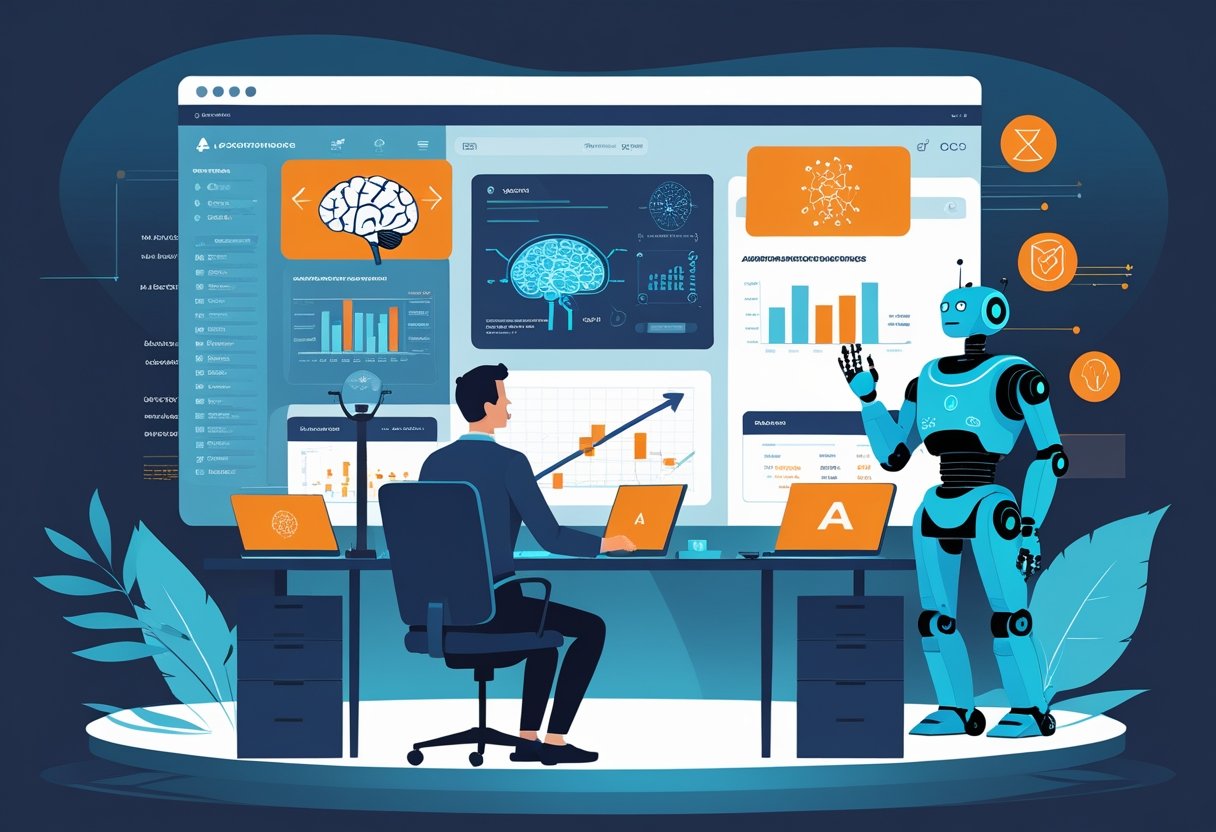Will AI Replace Accountants: Assessing the Future of Financial Roles
Artificial intelligence is changing industries at a dizzying pace, and it’s fair to ask if accountancy is next in line for major disruption. As software gets smarter, it can now handle repetitive tasks—like data entry and bookkeeping—way faster than any human. That’s got a lot of accountants feeling uneasy about job security.

AI isn’t taking over accounting jobs completely—at least not any time soon. But it’s definitely changing how accountants work and what they need to be good at.
While AI handles routine stuff, people still need to bring expertise and judgement to the table. Technology is making things more efficient, freeing up accountants to tackle work that actually matters.
If you care about the future of accountancy, it’s smart to keep tabs on what AI can and can’t do. That helps accountants, students, and business owners figure out how to stay ahead. There’s more detail on how AI is impacting accountants at Sage Advice UK: Will AI replace accountants? and Dext: Will AI Replace Accountants and Bookkeepers With Automation?.
How Artificial Intelligence Is Transforming Accounting
Artificial intelligence and machine learning are shaking up the way accounting gets done. These tools bring more speed and accuracy to jobs that used to be painfully slow.
Overview of AI and Machine Learning in Accounting
Artificial intelligence (AI) uses algorithms to crunch data and make choices without a person stepping in. Machine learning, which is a branch of AI, learns patterns from financial data and keeps getting better as it goes.
Today’s AI-powered accounting software sorts receipts, enters data, and matches invoices. These systems spot errors and sniff out fraud by flagging weird transactions. They also handle tax prep and expense management for everyone from big companies to freelancers.
AI in accounting isn’t just about saving time. It lets businesses focus on the tricky stuff by quietly taking care of the routine. Machine learning keeps improving, so the software gets smarter about new transactions and rules.
Core Capabilities of AI-Driven Accounting Tools
AI-driven accounting tools handle key tasks faster and more accurately than people can. Most systems automate:
- Data entry: Scanning receipts and plugging info into ledgers
- Bank reconciliation: Matching up bank records with company transactions
- Fraud detection: Spotting suspicious activity or mistakes in accounts
- Expense tracking: Sorting spending into categories in real time
- Financial reporting: Creating reports from live financial data
These tools sift through huge piles of data and catch mistakes people would miss. For example, AI can spot duplicate payments or missing invoices in seconds. Some tools even suggest ways to save money or cut down on taxes.
It’s wild how much more efficient and accurate the field is getting, especially with reports showing how AI is driving change in accounting.
Key Differences Between Human and AI-Enabled Accountants
AI systems excel at repetitive, rule-based work. They can run 24/7, process mountains of data, and don’t get tired or sloppy.
But humans bring judgement and a healthy dose of skepticism. They can interpret complicated rules and weigh ethical questions—things AI just can’t do. When decisions need context or a personal touch, people are still essential.
Accountants can talk strategy, explain tough choices, and handle curveballs. That kind of insight? AI isn’t close to matching it, according to recent industry analysis.
Most firms blend AI tools with human skills. This combo boosts accuracy and lets accountants spend more time advising and solving real problems.
The Current Landscape: Accountants and Automation
AI is shaking up accounting by taking over a lot of routine tasks. But when it comes to complex decisions and judgement calls, it still struggles.
Common Automated Accounting Tasks
Modern accounting leans on automation for repetitive, mind-numbing jobs. Think invoice entry, bank reconciliation, expense categorization, and receipt prep.
Lots of software now uses AI to scan invoices, match up transactions, and flag errors. Routine calculations and data imports? AI-powered apps handle those, slashing the need for manual work.
Some platforms crank out basic reports, send reminders for unpaid bills, and help with payroll. These tools speed up accountants’ work and help avoid mistakes.
With automation covering the basics, accountants can actually dig into analysis and give advice. They focus on judgement, planning, and insight—stuff tech just can’t mimic. For more on what’s getting automated, check out Dext’s review of common automated accounting tasks.
Limitations of AI in Financial Processes
AI has some pretty clear limits in accounting. Sure, it can crunch data and spot patterns, but it can’t replace financial judgement or handle weird exceptions that need a human’s touch.
AI doesn’t understand business goals, can’t keep up with changing tax laws, and won’t give professional ethics advice. It’s only as good as the data you feed it—bad or missing info leads to mistakes that humans have to fix.
Some jobs, like auditing tricky transactions or making forecasts for unique situations, need experience and critical thinking. Accountants also deal with sensitive info and strict legal standards. AI tools just don’t have the personal responsibility professionals do. For more on these challenges, see the limitations of AI in accounting.
Potential for AI to Replace Accountants
AI is making accounting work faster and more accurate. It can automate a lot, but when things get complicated or need a real judgement call, humans aren’t going anywhere.
Jobs Most at Risk in Accounting
The simplest, most repetitive accounting jobs are most at risk from AI. Data entry clerks, accounts payable assistants, and basic bookkeepers are likely to see the biggest shakeups.
These roles focus on recording invoices, sorting expenses, or running payroll—stuff AI does quickly and with fewer slip-ups. A 2023 survey on the Sage Advice UK blog shows that while traditional roles may shrink, new tech-savvy accounting jobs are popping up. Firms want folks who can handle both numbers and AI tools.
Tasks with little room for judgement are the easiest for software to automate. But accountants who learn new tech will protect their jobs from being replaced.
Tasks Requiring Human Decision-Making
Plenty of accounting still relies on human judgement and experience. Financial analysis, business advice, and audit planning need accountants to read the data, spot odd trends, and give advice that fits each business.
When helping a company plan for taxes or figure out how to cut costs, accountants have to understand complex rules and the business’s unique needs. AI can offer support, but it can’t always make the final call when context and ethics are involved.
A report from Coursera points out that the world’s biggest accounting firms say they won’t use AI to fully replace humans. Experts think the jobs that need big-picture thinking, creative problem-solving, and ethical judgement are safe in human hands.
Emerging Opportunities for Accountancy Professionals

AI is shaking up accounting, opening doors for new skills and fresh ways to work with technology. Accountancy pros are adapting as their roles shift and evolve.
New Roles and Required Skills
As AI grows in accounting, demand is rising for data analysis, process automation, and digital advisory roles. Accountants are picking up skills in coding, data visualization, and system integration to handle these tech-heavy tasks.
They’re also learning to interpret what AI-powered software spits out—from automated invoices to tax calculations and fraud detection. Soft skills like communication and critical thinking matter more than ever. Accountants need to explain tricky AI findings to clients and coworkers who might not be tech-savvy.
Organizations want people who can bridge the gap between tech and business. One recent report even suggests that up to 70% of accounting job skills will shift by 2030. If you want more, check out how AI is set to boost productivity and jobs in accountancy.
Integrating AI with Human Expertise
Accountancy professionals are using artificial intelligence tools to improve efficiency. They still rely on their own judgment for complex or sensitive matters.
AI can process huge sets of financial data quickly. But it just doesn’t have the understanding needed for unique scenarios or sticky ethical dilemmas.
Human expertise is essential for things like financial strategy, compliance interpretation, and personalized tax advice. Accountants review AI-generated reports and check for errors.
They provide context that technology alone just can’t offer. By combining their experience with digital tools, they add value and help ensure high-quality outcomes.
AI supports, but doesn’t replace, the insights and decision-making skills that professionals bring to the workplace. There’s more detail on how AI will impact the tax and accounting profession if you’re curious.
Challenges and Risks of AI Adoption in Accountancy

Artificial intelligence is changing how accounting professionals work. It also creates new risks that can’t be ignored.
Adopting these systems brings up concerns about fairness, data protection, and decision-making. Sometimes it feels like every answer raises more questions.
Ethical Considerations and Bias
AI tools in accountancy rely on huge amounts of past data to make predictions and spot patterns. These systems can make errors if the data has hidden biases or lacks diversity.
If a model is trained on flawed financial records, it might repeat old mistakes. That’s a real risk, and it’s not just theoretical.
Poorly designed AI models can make unfair choices when judging financial risk, leading to ethical issues. Accountants need to monitor AI outputs to avoid discrimination and keep things transparent.
They should clearly communicate how AI reaches its conclusions so clients and regulators can understand decisions. Strong ethical guidelines, regular audits, and human oversight are a must.
Accountancy firms are working on new best practices to set boundaries for how they use AI. It’s a learning process for everyone.
Data Privacy and Security
Accountants manage sensitive financial records, tax filings, payroll data, and banking information. When artificial intelligence accesses this information, privacy concerns get even more serious.
AI systems can be targeted by hackers if firms don’t protect them properly. Strict data security measures are needed, including encryption and multi-factor authentication.
Legal rules like GDPR in the UK require that personal and financial data be handled with care. Firms need to review their security policies often and train staff in best practices.
Weak AI controls might expose client data to theft or misuse. It’s crucial for accountancy professionals to choose trustworthy AI vendors and keep software updated.
They also need to react quickly to security incidents. This helps keep private information safe and builds client trust in AI-driven accounting services.
The Future Outlook: AI and the Evolving Role of Accountants
Artificial intelligence is streamlining daily accounting tasks. It’s also creating demand for new skills and responsibilities.
Accountants are expected to focus more on advisory roles and decision-making. Technology now handles a lot of the repetitive stuff.
Predictions for the Next Decade
In the next ten years, artificial intelligence will automate routine bookkeeping, invoice processing, and data entry. Accountants will spend less time on manual work, which should cut down on errors and speed up reporting.
AI won’t replace accountants, but it’ll change what people expect from them. They’ll play a bigger part as business advisors, using AI-driven data to help clients and companies make smarter choices.
Accountants who learn to use AI tools will find their work gets more efficient and valuable. According to experts, the accountancy field will see higher productivity and new jobs, but digital skills will matter more than ever.
Key changes to expect:
- Faster and more accurate financial reporting
- Greater focus on interpreting and explaining results
- New opportunities for jobs related to technology
Balancing Technology and Human Judgement
Even as artificial intelligence gets more advanced, it can’t replace the judgement and ethical standards that accountants bring. Technology helps with number crunching and pattern recognition, but it just doesn’t have the same human insight in tricky decisions or understanding those weird, one-off business situations.
Accountants still need to question results and catch mistakes that AI might miss. They also have to make sure choices stay ethical.
It’s up to them to decide when to trust AI’s suggestions and when to lean on their own experience. That’s not something you can automate away—at least not yet.
Key areas where human skills remain essential:
| Area | AI’s Role | Human Accountant’s Role |
|---|---|---|
| Routine Calculations | Automation | Oversight |
| Strategy & Advisory | Data Insights | Interpretation, Guidance |
| Ethical Judgement | Limited | Decision-making, Responsibility |
Honestly, combining technology and human judgement just works better for everyone—clients, firms, you name it. If accountants keep adapting and learning, they’ll stay right at the heart of things in this digital age, using both smart tech and good old-fashioned expertise. For more, see how accountants’ roles are evolving.















